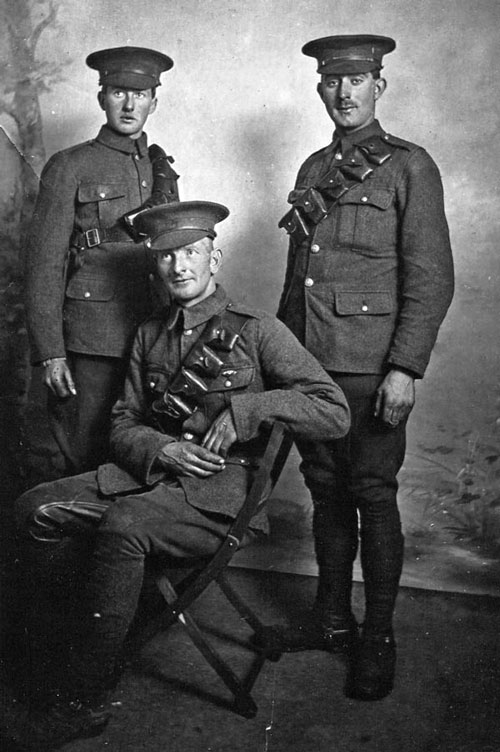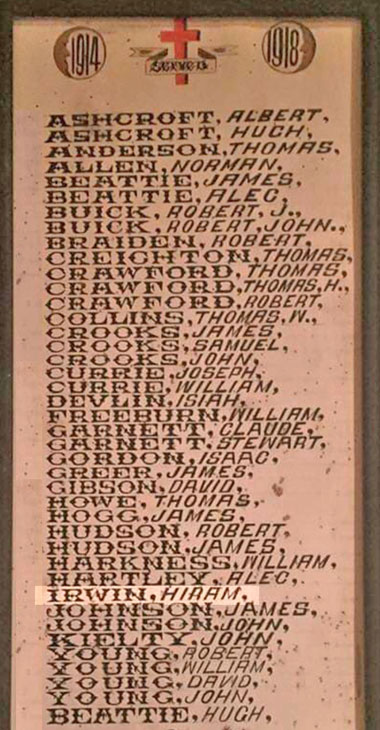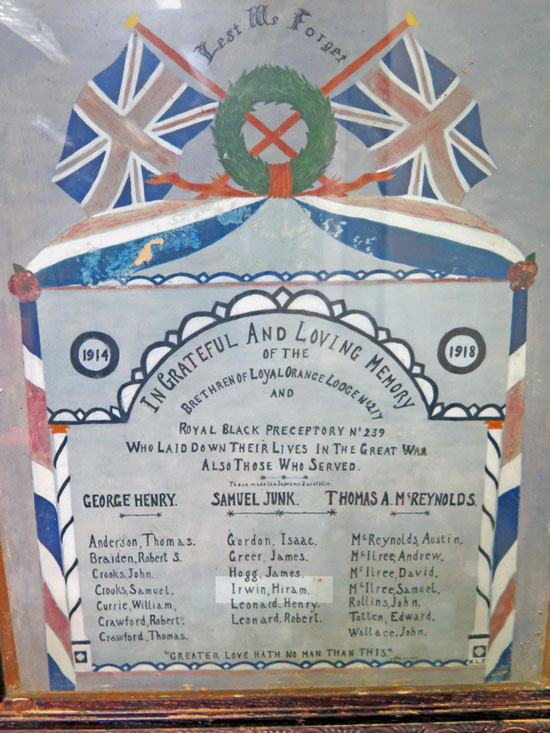Private Hiram Irwin

Irwin (seated) with North Irish Horsemen Thomas Collins (standing right) and James Marks (standing left)
Hiram Irwin was born on 10 August 1883 at Ballymaguire, Stewartstown, County Tyrone, the fourth of eight children of farmer David Irwin and his wife Margaret (nee Foster). By 1911 he as living at Ballymaguire with his parents and five siblings and working on the farm.
Irwin enlisted in the North Irish Horse on 5 March 1909 (No.304 – later Corps of Hussars No.71018). He embarked for France with A Squadron on 17 August 1914, seeing action on the retreat from Mons and advance to the Aisne. A Squadron then served as escort to the Commander-in-Chief of the BEF until 4 January 1916, when it was posted as divisional cavalry to the 55th Division.
Irwin's activities in France and Belgium were reported-on a number of times in the Mid-Ulster Mail:
On 14 August 1915:
Trooper Hiram Irwin, North Irish Horse, whose mother resides at Ballymaguire, has been home on furlough for a few days, returning to the Front on Saturday last. He has been on the North Irish Horse for almost four years and was called up for active service on 6th August, 1914, two days after war was declared. He landed in France on 17th August. He says the cavalry, as such, are found of little or no service in the present war. A number of men are detailed to look after the horses and the others take their turn in the trenches with the infantry. His worst experiences were in the retreat from Mons, where, as he says, he "saw some rough work." The Germans were ten to one and with superior equipment, and in his opinion and that of all serious minded persons who took part, the escape of the British was by the guidance of God. The cruelties of the Huns and the dread of the civil population came under his observation. The inhabitants of the towns were almost wild with joy when the British troops entered, but only to be replaced by the wildest grief when, perhaps but a brief time later, they were ordered to retire further. The frantic efforts of mothers to escape with their children were heart-rending to witness; of the scenes in towns out of which the Germans had been driven he did not care to speak. For the past six months he has, with about 150 other members of the North Irish Horse, been acting as bodyguard to Sir John French. There is always an element of subdued excitement about the headquarters with stealthy comings and goings, but of what is happening in the fighting line the troopers know little or nothing. The enemy are strongly entrenched in dug-outs, lined with re-inforced concrete, and the general opinion is that to drive them out would be a most desperate undertaking. When one of their elaborate trenches have been rendered untenable by sap and mine grenade, or other bomb attacks, they have only to retire for 100 yards or so to take up another and equally strongly prepared position. The tactics seem to be attrition and Trooper Irwin believes, that while it may take time, that success is certain for the Allies. His immediate chums at the front are Troopers Wesley McClelland, son of Mr. Sloan McClelland, the White House, Cookstown, Jim Marks, Dromads, Albert James McKenna, Tullyhogue, and Wm Cunningham, Clough [Coagh], and they were all in good health and spirits when Trooper Irwin left France at the end of July.
On 2 October 1915:
Trooper W. Cunningham, North Irish Horse, whose home is in Drapersfield, arrived home on the 16th for a short leave, and left again on the 20th. he went out to France with the first contingent, and saw a good deal of fighting in the earlier stages of the war. During recent months he has been on Sir John French's bodyguard. He was looking very fit and in good heart, after over a year on active service. His immediate chums in France are Troopers Wesley McClelland, Hiram Irwin, John Marks, Joseph MacKenzie, Wm. Anderson, and A. J. McKenna, and these were all well when he left.
On 16 October 1915:
Trooper James B Marks, of the North Irish Horse, has just paid a visit to his parents who reside at Drumads, Coagh. Jim, who was well known in Coagh and district, was called up for active service at the beginning of hostilities, and is only once home on leave since then. He was looking fit and well, and although taking part in many engagements, including the retreat from Mons, he has so far escaped uninjured. He has been serving with the bodyguard of Sir John French, and amongst some of the local soldiers with whom he was acquainted in France he mentioned Troopers Wesley McClelland, Cookstown, and Hiram Irwin, Drapersfield. During his short stay at home he has numerous visitors, to all of which he spoke well of his treatment both in France and Belgium, but of any other experiences at the front he didn’t care to say anything, except that he had been fortunate in escaping so far. Trooper Marks has now returned to his unit in France again, leaving Coagh on Wednesday.
A letter he wrote to the Mail was published on 5 February 1916:
Dear Sir, – I have just noticed a letter from a comrade in ‘C’ Squadron of this regiment, in which he takes the doubtful pleasure of informing those of whom it is of interest, that the Squadron to which he belongs ('C' Squadron) ought not to be confounded with 'A' Squadron or any other cavalry attached to what seemingly is, in his opinion, odious G.H.Q. He perhaps doesn’t recognise the fact that the first duty of a soldier is to obey orders; unquestionably he has not the power to choose. I can scarcely realise that he is so little minded in that he attempts to cast a slur on a Squadron of his own regiment; but if he does, for his information I would have him to understand that 'A' Squadron was engaged in fighting until the time when the Commander-in-Chief of the British Army in France conferred on it the coveted honour of selecting it alone, from the army at his supreme disposal, to act as his personal bodyguard. On his departure from this country he gave the Squadron unstinted praise for the manner in which it fought successfully, in the most trying of circumstances, and also for the capable and efficient manner in which it discharged its onerous and responsible duties as bodyguard.
Should the information gratify him, the Squadron is now acting as Divisional Cavalry, in which capacity, in the humble opinion of the writer, it can 'carry on' quite as well, if not even with greater honour, than that already attained by 'C' Squadron.
Signed on behalf of the Cookstown boys serving with 'A' Squadron North Irish Horse, H. IRWIN. 'A' Squadron N.I.H., France, 30th Jan., 1916.
Another letter was published on 9 September 1916:
Dear Mr. Ferguson, – Words cannot express my sincere thanks to you and your kindness in sending me such a useful parcel of "cigs." All the boys from around our part are here, so we have a fine smoke. The weather here is rather damp – wouldn’t be good for harvesting. All the boys join in sending their very best thanks.
In May 1916 A Squadron joined with D and E Squadrons to form the 1st North Irish Horse Regiment, serving as corps cavalry to VII, XIX, then V Corps until March-April 1918, when the regiment was dismounted and converted to a cyclist unit, serving as corps cyclists to V Corps until the end of the war. Irwin remained with the regiment throughout.
In August or September 1918, during the initial phase of the Advance to Victory offensive, Irwin was wounded in the right shoulder and gassed.
On 11 February 1919 he was discharged under Paragraph 392 (xvi(a)) of King's Regulations – being surplus to military requirements (having suffered impairment since entry into the service).
After the war he returned to farming. In 1956 while living at Edernagh, Ardtrea, County Tyrone, he fell ill. He died at South Tyrone Hospital, Dungannon, on 18 August 1956.
Irwin's name is recorded on the Coagh Orange Hall Roll of Honour and the Kingsmills Orange Hall Roll of Honour.

Coagh Orange Hall Roll of Honour

Kingsmills Orange Hall Roll of Honour
Images sourced from Friends of the Somme Mid Ulster Branch - Coagh website, who received it courtesy of Dessie Gordon.
